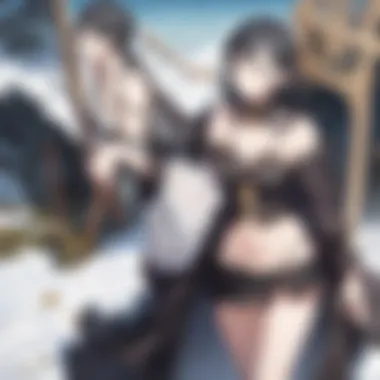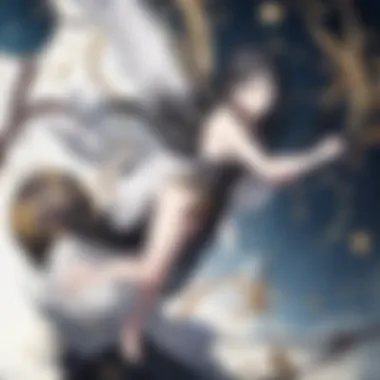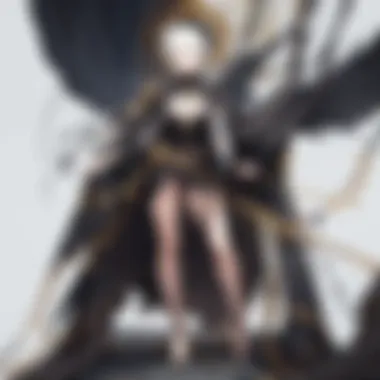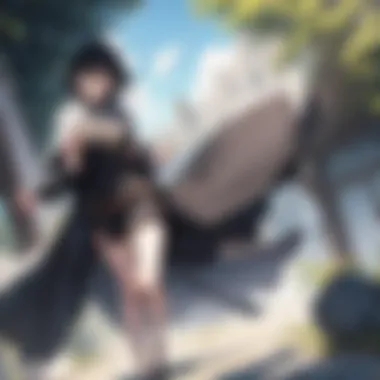An In-Depth Exploration of Black Clover: Themes and Impact


Intro
In today’s landscape of anime and manga, few series manage to carve out a distinctive identity like Black Clover. Its combination of action, magic, and determination resonates deeply with viewers and readers alike. As we dive into the core elements that form the backbone of this series, it becomes imperative to explore its characters, the themes woven into its narrative, and the overall impact it has had within the anime community. This exploration aims to present a detailed guide that caters to both casual fans and those who delve into the intricacies of the story.
Character Analysis
Overview of Character Development
Black Clover introduces a diverse cast of characters, each with their own unique backstories and motivations. Central to this ensemble are Asta and Yuno, two orphans raised together but possessing contrasting personalities. Asta, born without magic, embodies perseverance and unyielding spirit, while Yuno, naturally gifted, represents talent and ambition. Their dynamic sets the stage for a rich narrative of growth and rivalry.
Throughout the series, character development is a pivotal focus. Asta's journey is not just about competing against Yuno; it reflects on overcoming adversity and embracing one's identity. Other characters, such as Noelle Silva and Tabata, also experience significant growth, challenging their own insecurities and evolving as powerful warriors. The twist of magic plays a crucial role in this transformation, showcasing how different individuals confront their limitations and turn them into strengths.
Key Relationships and Dynamics
The relationships between characters often drive the narrative forward, establishing deep emotional connections. This includes Asta and Yuno's rivalry, which is not merely antagonistic; it fuels their respective development. Their friendship showcases a balance between rivalry and camaraderie, propelling both characters to reach new heights. Additionally, the bond with their mentor, Captain Yami Sukehiro, introduces themes of guidance and mentorship, while also highlighting the necessity of believing in oneself.
Other relationships, such as the dynamics between the Black Bulls' members, add richness to the story. Characters like Noelle and Finral bring in humor and complexity, forming a unique family-like bond within the squad. Such interactions emphasize the importance of teamwork and support, which resonates well with the overarching theme of friendship that is prevalent in many anime series.
Thematic Exploration
Central Themes and Messages
At its core, Black Clover is emblematic of several profound themes, including hard work, ambition, and determination. Asta's unwavering resolve to become the Wizard King mirrors the struggle of individuals striving to achieve their dreams against all odds. His journey offers a reflection on the power of perseverance and self-belief, irrespective of intrinsic limitations.
Moreover, the theme of rivalry is critical. Yuno and Asta’s ongoing competition serves as a narrative tool to highlight contrasting approaches to strength—one being innate talent and the other being hard-earned effort. This inherent conflict drives the plot and offers insight into the nature of success and self-improvement.
Cultural Context and Influences
The cultural backdrop of Black Clover can be traced to the genre conventions of shonen anime and manga. It reflects traditional samurai and knight archetypes while infusing modern storytelling. The influence of Japanese culture in fantasy elements is evident, as magic often serves as a metaphor for strength and social hierarchy.
The reception of Black Clover in the anime community has been noteworthy. Fans appreciate how it brings classic tropes into contemporary storytelling. The series has prompted discussions around personal growth and the definition of heroism in modern narratives, contributing to its popularity and enduring status within the genre.
"In a world where magic determines one's worth, Asta's struggle stands as a testament to the power of the human spirit."
In summary, Black Clover not only entertains but also challenges viewers to reflect on significant themes and character development. Its cultural relevance remains an integral aspect of its narrative, enriching the anime landscape.
Prologue to Black Clover
Understanding the world of Black Clover is essential for both casual fans and serious enthusiasts of anime and manga. This series stands as a notable example of modern storytelling within the genre, blending action, friendship, and growth in a refreshing manner. In this section, we will explore key elements that define the series, the importance of its themes, and how its characters contribute to an overall narrative that captivates audiences.
Overview of the Series
Black Clover follows the journey of Asta, a young boy born without any magical power in a world where magic is everything. In a unique twist, the story emphasizes perseverance, showcasing Asta’s undeterred spirit as he strives to become the Wizard King. The vibrant world is populated with diverse characters, magical systems, and rigorous challenges that Asta and his friends must tackle.
The narrative arc is rich, combining personal ambitions with broader themes of friendship and rivalry. The character development is notable, allowing audiences to witness growth not just in Asta, but also in his companions. These storylines create a strong emotional connection, drawing viewers deeper into the lore of the Black Clover universe.
Historical Context and Release


Black Clover made its debut in 2015 as a manga series, created by Yūki Tabata. With its publication in Weekly Shōnen Jump, it quickly gained traction among readers. The anime adaptation followed in 2017, produced by Pierrot, which is known for other well-received series like Naruto. The blend of familiar anime tropes with unique elements helped Black Clover carve out its niche in the saturated market of shōnen titles.
The historical context of its release is significant as it arrived during a time when fans were looking for fresh narratives that deviated from established norms. This timing allowed Black Clover to attract a diverse audience who appreciated its blend of traditional shōnen elements and innovative character dynamics. The series not only features a compelling storyline but also reflects broader societal themes, enhancing its relevance in contemporary discussions of anime and manga.
"Black Clover has redefined expectations of its genre, merging classic elements with innovative storytelling techniques that resonate with modern audiences."
In summation, the introduction of Black Clover is crucial for grasping its wider implications in the anime world. By examining the overarching story and its context, we can appreciate the depth and complexity that Black Clover offers, setting the stage for a more profound exploration of its characters and themes in the subsequent sections.
Plot Structure and Narrative Mechanics
Understanding the plot structure and narrative mechanics of Black Clover is essential for comprehending the series' depth. The arrangement of events and the way they interweave significantly shape the audience's experience. From character development to thematic revelation, the narrative architecture creates a rhythm that engages viewers and readers alike.
Narrative mechanics involve how the plot unfolds and how the characters evolve over time. These elements are crucial because they determine the pacing of the series and influence emotional responses. For Black Clover, the blend of focused story arcs and character-driven plots creates a balance between action and emotional engagement.
Main Story Arcs
The main story arcs of Black Clover are pivotal in establishing the series' direction. Typically, the arcs revolve around Asta's journey from an underdog to a formidable contender in a world dominated by magic. Each arc presents unique challenges that test Asta's resolve, often resulting in significant growth for him and his companions.
Some notable arcs include:
- The Magic Knights Entrance Exam: This serves as an introductory point. It sets the tone for competition, showcasing Asta's determination despite his lack of magic.
- The Spade Kingdom Arc: In this segment, tensions rise as Asta and his allies confront new antagonists. The stakes increase, contributing to the development of complex character dynamics.
- The Elf Resurrection Arc: This arc introduces deeper lore and raises questions about fate and redemption. It reflects the show's ability to weave intricate storylines around its central theme of friendship.
These arcs not only provide excitement but also enrich the narrative. The progression reflects the themes of perseverance and self-discovery, drawing viewers deeper into the story.
Pacing and Narrative Flow
Pacing in Black Clover is a meticulous craft that impacts how the story is perceived. The series effectively alternates between fast-paced battles and more contemplative moments, allowing viewers to digest events and develop connections with the characters.
Fast-paced sequences often involve intense battles. These sequences are visually engaging and keep the audience on the edge of their seats. Conversely, quieter moments are used for character exploration and relationship building, enhancing emotional depth. The transitions between these types of scenes can feel seamless, allowing for a smooth narrative flow.
Reflecting on the pacing, one can observe:
- Effective use of cliffhangers: Each episode often ends on a note that urges viewers to continue watching, maintaining suspense.
- Character-driven slow moments: These instances allow for significant character introspection that enriches the viewer's understanding of motivations.
Ultimately, the pacing and flow of the narrative in Black Clover highlights its strengths. The combination of thrilling action and reflective character development not only engages the audience but also fortifies the overarching themes of growth and camaraderie.
Character Analysis
The analysis of characters in Black Clover is crucial for understanding its narrative richness and thematic substance. Each character serves a purpose that extends beyond the surface-level traits, impacting the plot and the dynamics of the story. The characters are intricately woven into the fabric of the narrative, and their development often mirrors significant themes such as friendship, rivalry, and personal growth. This in-depth examination allows fans to appreciate the nuanced portrayal of motivations and relationships, revealing the layers that contribute to the overarching message of the series.
Protagonist: Asta
Asta, as the protagonist, embodies the themes of perseverance and determination. Unlike most characters in the Black Clover universe, he was born without magic, which establishes a unique platform for his growth. His tenacity, coupled with his desire to become the Wizard King, sets the stage for his character journey. Asta's character serves as a contrast to others who possess magical abilities.
His struggle to overcome this limitation resonates with the audience, illustrating that hard work can triumph over innate talent. Asta’s relationships with characters like Yuno and Noelle also enhance his development and add complexity to the narrative. His unwavering spirit inspires those around him and often challenges the status quo, making him a key figure in the exploration of the series’ central themes.
Supporting Characters
The supporting characters in Black Clover are just as pivotal to the narrative as Asta himself. Characters like Yuno, Noelle, and even the members of the Black Bulls each bring distinct perspectives and contribute to Asta's story significantly.
- Yuno represents the traditional path to success, being a gifted magician from a noble family.
- Noelle grapples with self-doubt and personal insecurities related to her family's expectations, allowing viewers to explore themes of personal growth and acceptance.


These supporting characters undergo their own arcs of development, which often intersect with Asta’s journey. Their interactions help to highlight important themes such as friendship, teamwork, and rivalry.
Antagonists and Their Motivations
The antagonists in Black Clover add depth to the narrative with motivations that reveal different aspects of the magic and its societal implications. Villains like Licht and the Dark Triad illustrate varying philosophies regarding power and societal structure. Their actions are often driven by personal grievances or a desire for revenge, which complicates the audience's perception of villainy.
- Licht, for instance, portrays a tragic figure whose motives stem from historical injustices, providing context to his antagonistic actions.
- The Dark Triad embodies betrayal and ambition, seeking to reshape the world according to their own ideals.
Understanding the motivations of these antagonists not only enhances the conflict but also invites viewers to question the moral dichotomy often present in battle-focused narratives. The portrayal of complex villains enriches the series and prompts discussions about the nature of power and the cost of ambition.
Themes and Symbolism
Exploring Black Clover requires an understanding of its prevalent themes and underlying symbolism. These elements contribute significantly to the depth of the narrative and the development of its characters. This section will dissect three crucial themes: friendship and rivalry, magic and its implications, and perseverance and self-discovery. Each theme not only enriches the storytelling but also reflects broader societal values and philosophical questions that resonate with viewers and readers alike.
Friendship and Rivalry
The dynamics of friendship and rivalry in Black Clover serve as a fundamental backbone to the story. The protagonist Asta's journey is shaped significantly by his relationships with his peers, particularly his close friendship with Yuno. This connection showcases the duality of companionship and competition.
- Friendship is portrayed as a source of strength. Asta and Yuno support each other despite their contrasting abilities. Asta's lack of magic is juxtaposed against Yuno’s exceptional talent, yet both motivate each other to grow.
- Rivalry is equally important, pushing characters to their limits. The competitive spirit is particularly evident in the Magic Knights squads, forming a landscape where friendships are tested by ambition. This tension cultivates growth, making each character confront their weaknesses.
In a way, Black Clover reflects the idea that friendships are not merely supportive but also challenging. This complexity makes the relationships in the series feel authentic and relatable.
Magic and Its Implications
Magic is central to the world of Black Clover and serves as a rich field for thematic exploration. It is not just a tool for combat; it symbolizes potential, status, and personal growth within the narrative. For instance, Asta's struggle against a world dominated by magic underscores a critical philosophical question: what defines capability?
- The Essence of Magic: The series utilizes magic to establish class systems. Those with strong magical abilities hold power and status, while Asta, lacking magic, represents the underdog. His journey emphasizes the values of hard work and determination over innate talent.
- Consequences of Magic: The series also delves into the darker implications of magic. Characters wield it for personal gain or revenge, leading to conflicts that underline ethical considerations. This duality encourages viewers to reflect on how power can corrupt or uplift.
Through magic, Black Clover prompts viewers to ponder notions of worth and achievement, elevating it from a simple shonen story to one that engages with larger societal themes.
Perseverance and Self-Discovery
Another key theme in Black Clover is perseverance and the journey of self-discovery. Asta embodies resilience in the face of challenges, illustrating that self-worth is earned through effort rather than predetermined by background or ability.
- The Journey of Growth: Asta’s relentless pursuit of becoming the Wizard King exemplifies the theme of perseverance. His character serves as a symbol of hope, demonstrating how challenges can be overcome through determination.
- Finding One's Identity: Each character's journey includes moments of self-discovery. For instance, Yuno grapples with the expectations of his heritage, while other supporting characters confront their own insecurities and aspirations. These individual paths not only enrich character development but also resonate with the audience's own experiences of growth.
Art and Animation Style
The art and animation style of Black Clover plays a crucial role in shaping the viewer's experience. This aspect is not merely aesthetic; it significantly influences how the story is perceived and the impact it has on its audience. The vibrant colors, striking character designs, and fluid animation contribute to a rich visual storytelling experience, making the series stand out in a crowded field.
Character Design
Character design in Black Clover goes beyond physical appearance. Each character's design reflects their personality, background, and development throughout the series. For instance, Asta, the protagonist, is characterized by his spiky blonde hair and distinctive green eyes, which symbolize his determination and drive. In contrast, characters like Yuno, with calm features and a more subdued color palette, embody different traits like composure and strategic thinking.
The sharp, crisp outlines and diverse outfit designs enhance the individuality of characters. Members of different magic squads have unique costumes that represent their abilities and roles within the narrative. This attention to detail allows viewers to easily identify characters, enhancing engagement and emotional investment in their journeys.
Moreover, the art style effectively captures the magical elements of the series. Spells are illustrated with vibrant, flowing designs that help convey the fantastical nature of the world. This elevates the sense of awe and excitement during key moments, involving audiences in the battles and emotional arcs without utilizing excessive exposition.


Battle Sequences
The battle sequences in Black Clover are a testament to the series' animation quality. They are choreographed to be visually stimulating, with rapid movements and dramatic effects that maintain viewer interest. The animation team focuses on dynamic angles and camera movements that enhance the intensity of clashes, making every spell cast feel impactful.
"The fight scenes showcase a blend of creativity and technical prowess, ensuring each encounter feels unique and memorable."
Each character's fighting style is distinct, reflecting their personality and abilities. This is evident in how Asta fights without magic, relying solely on physical strength and strategic maneuvers, contrasting with other characters who wield impressive magical abilities. The differentiation keeps battles fresh and engaging, providing a varied viewing experience.
Furthermore, animation fluidity is crucial in conveying high-stakes moments effectively. Moments of tension build through slower pacing, while action is punctuated with swift movements, enhancing the emotional weight of each clash. This balance contributes to a deeper investment in the outcomes of battles, drawing viewers into both the action and the stakes involved.
Cultural Impact of Black Clover
The cultural impact of Black Clover has become a significant aspect of its identity in the world of anime and manga. This series not only entertains but also resonates with its audience on various levels. From character development to the themes presented, Black Clover has carved a niche that impacts its fandom positively.
Reception Among Fans and Critics
The reception of Black Clover among fans and critics has been notably mixed, with certain elements appreciated while others faced scrutiny. Many fans praise Asta, the protagonist, for his relentless resolve and ability to inspire those around him. This characterization appeals to viewers who value perseverance in the face of adversity.
Critics often point out the common tropes present in Black Clover, such as magic battles similar to those in other popular series like Harry Potter or Naruto. However, these comparisons do not diminish the show's uniqueness. Instead, they highlight how Black Clover operates within familiar frameworks while adding distinct flavors. Its ability to engage audiences lies primarily in its character arcs and their development throughout the series.
"Black Clover is a testament to how character growth can enhance a narrative, despite the presence of well-trodden pathways."
Fans actively discuss favorite moments, and the most revered episodes on platforms like Reddit serve as a testament to the series' cult status. The community surrounding Black Clover plays a crucial role in enhancing its cultural relevance, allowing it to function as a platform for fans to share interpretations, theories, and artistic creations.
Contribution to the Anime Genre
Black Clover contributes to the anime genre by merging traditional themes of friendship and rivalry with unique narrative structures. It's not only the magic aspect that distinguishes it but also how these themes mold character interactions and plot progression. In doing so, it adds richness to an already diverse genre.
The series encapsulates the journey of growth well. Many anime focus solely on the protagonist’s rise to power. In contrast, Black Clover shows how collaboration and rivalries can coexist and thrive. The depiction of different magic types showcases creativity and imagination, making it a worthy addition to the magical girl/boy genre. This innovative approach to storytelling ensures that the series remains relevant and engaging for both newer and long-term fans.
Merchandising and Spin-offs
Merchandising has become a vital component of Black Clover, reflecting its popularity and commercial success. The series has spawned a broad range of products including figurines, clothing, and accessories featuring beloved characters. Such merchandise serves as physical memorabilia that connects fans to the series more deeply.
Spin-offs, including manga adaptations and light novels, further expand the Black Clover universe. These additional works explore various storylines and characters, offering fans a chance to engage with the world beyond the main series. They provide fresh insights into character backgrounds and motives, enriching the overall narrative tapestry.
In summary, the cultural impact of Black Clover is profound and multifaceted. It enhances the anime landscape while fostering a community of fans who appreciate its themes and characters. As the series continues to evolve, its legacy in the anime community will likely grow, making it an essential subject of study for future enthusiasts.
The End
The conclusion of this article plays a pivotal role in encapsulating the essence of Black Clover. It distills the intricate themes and character dynamics discussed throughout. For enthusiasts of anime and manga, a conclusion not only sums up the arguments but also reinforces the bonds that tie these components together. It allows readers to reflect on how Black Clover stands as a significant narrative in contemporary anime culture.
Final Thoughts on the Series
Black Clover has carved a niche for itself in the anime landscape. The series showcases a blend of traditional shonen themes and modern storytelling techniques. Asta, the tenacious protagonist, exemplifies the series' exploration of hard work and ambition. Contrastingly, characters like Yuno provide an intriguing look at rivalry and friendship, enriching the story's emotional depth.
The magic systems in Black Clover are not merely plot devices. They reflect the characters’ personalities and evolve with their journeys. In essence, the series successfully combines action with thoughtful character development. Fans admire its ability to tackle challenging themes such as perseverance in the face of adversity.
Moreover, the art style enhances viewer engagement, making battles not just visually appealing but also thematically relevant. Overall, the series maintains a compelling narrative that resonates with its audience and encourages deeper analysis.
Future Prospects for Black Clover
The future of Black Clover appears promising, driven by the ongoing popularity of the manga and anime adaptations. Upcoming arcs have the potential to explore new themes and character developments. As the story unfolds, viewers may witness a deeper exploration of magic and its societal implications.
The potential for spin-offs or side stories is viable. Themes that parallel Asta's journey can be expanded upon, opening doors for various character arcs. More extensive merchandising and collaboration projects are likely as Black Clover continues to grow its fanbase.















